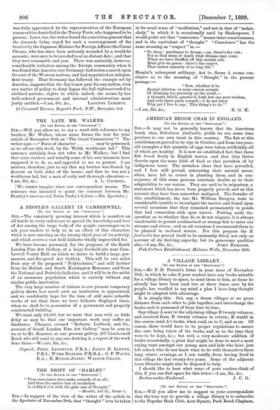THE DRIFT OF "HAMLET."
[To THE EDITOR OF THE "SPECTATOR."] " Thus conscience does make cowards of us all; And thus the native hue of resolution Is sicklied o'er with the pale cast of thought."
—Hamlet, Act iii., Scene 1.
Sin,—In support of the view of the writer of the article in the Spectator of November 30th, that " thought " is to be taken in its usual sense of "meditation," and not in that of "melan- choly," in which it is occasionally used by Shakespeare, I would point out that "conscience " means inner consciousness, and is the equivalent of " thought." " Conscience" has the same meaning as " respect " in :-
" To sleep ! perchance to dream ;—ay, there's the rub ; For in that sleep of death what dreams may come, When we have shuffled off this mortal coil, Must give us pause : there's the respect,
That makes calamity of so long life."
Hamlet's subsequent soliloquy, Act iv., Scene 4, seems con- clusive as to the meaning of " thought " in the present passage :—
"Now, whether it be
Bestial oblivion, or some craven scruple Of thinking too precisely on the event,— A thought which, quarter'd, bath but one part wisdom, And ever three parts coward,—I do not know Why yet I live to say, This thing's to do."






















































 Previous page
Previous page